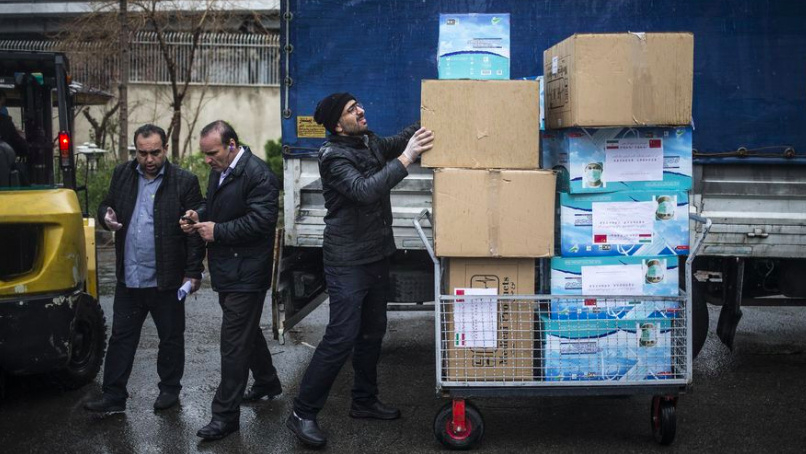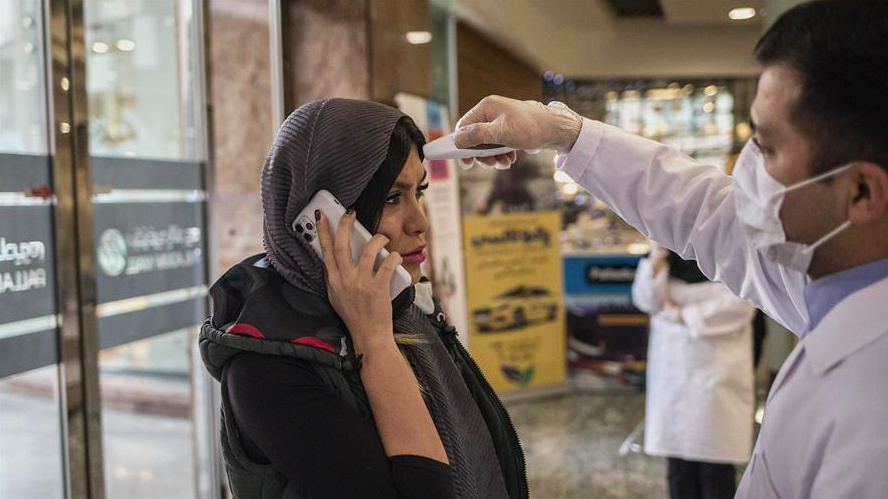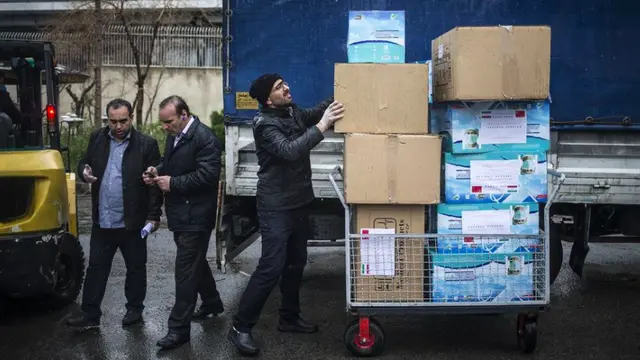
The staff of Iran's Ministry of Health and Medical Education arrange boxes of masks donated by China in Tehran, Iran, February 25, 2020. /Xinhua
Editor's note : Bobby Naderi is a journalist, current affairs commentator, documentary filmmaker and member of the Writers Guild of Great Britain. The article reflects the author's opinions, and not necessarily the views of CGTN.
On Thursday, March 5, China's Foreign Ministry Spokesman Zhao Lijian urged the world community to lift sanctions on Iran to help its government and people's fight against novel coronavirus epidemic, noting that "The continued imposition of unilateral sanctions on Iran is contrary to the spirit of humanitarianism."
The outbreak of COVID-19 has affected almost each and every province in Iran. The number of patients has overwhelmed local resources, the virus is attacking the most vulnerable points of the national health system.
Nearly 300,000 trained foot soldiers, volunteers, public health workers and specialists have been dispatched to outbreak regions up and down the country to identify people with this new infectious disease.
The outbreak, one of the world's largest, is gathering pace and health workers are discovering previously existing cases. They are sanitizing homes, public places and surfaces that harbor the deadly virus. They have identified numerous potential cases and clusters of people with similar symptoms, all while quarantining the sick and exposed. By Friday, March 6, the number of infections had risen to over 4,700 with the death toll being 124.
But avoid reading too much into those numbers as the severity of the crisis is bigger. It is commendable that Iran managed to identify its first cases after it received advanced test and diagnostic kits first from China and later from Europe.
However, there aren't yet any vaccines or therapeutics and given the ongoing trade and banking restrictions imposed by the United States, the contagion will only get worse.
Keep in mind that the shortages of advanced testing kits and other equipment contributed to an earlier under-count when there were no widespread testing. Amid the shortages, disruptions and supply-chain problems, Iran has become the hub of a major outbreak in the Middle East.

Checking a customer's temperature at the entrance of a shopping center in northern Tehran, Iran, March 5, 2020. /Xinhua
Soon we will find out many more people have been infected as medical workers visit towns and villages in 31 provinces to conduct tests. They have this capacity and are cooperating with infectious disease experts from China and the World Health Organization. When hospitals and medical centers fall short – and if this happens not all patients will receive the necessary medical care – don't blame the experts. The manufacture of medical products in Iran depends on imported ingredients and materials and they have all been curtailed by sanctions imposed by the United States and its allies.
How? For example, as a recent Foreign Policy article, entitled "As coronavirus spreads in Iran, sanctions are making it worse," points out, although "Iranian companies (produce) medicine, disinfectants, and protective clothing," their production relies on imported ingredients and materials. However, as the U.S. sanctions mean Iran's imports have become more reliant on its transport links with regional countries, in the wake of the increasing restrictions put in place by these countries on transportation with Iran, the supply of raw materials of ingredients to the country has taken a significant hit.
Are the countries imposing sanctions on Iran not ashamed of their hard hearts? If they respond with genuine empathy and understanding, shame cannot survive. The epidemic is an unpleasant lesson in what happens when a country is unethically sanctioned in great violation of international norms and international human rights law.
The laws and norms overlap greatly on this planet of ours, to the extent that they oblige all United Nations member states to respect and promote this mutually beneficial relationship, and in particular, to prevent a pandemic. Like other nations, the people of Iran have the universal right to health like all countries' citizens do. We have relevant health-related obligations per the international human rights law to contribute to this right.
For all its importance, there is a limited window to fight the COVID-19 epidemic and Iran needs help from all governments. The world must be prepared for the reality that there will be more cases, especially in rural communities where people bear the brunt of the illnesses and where the virus is circulating fast while inventories in medical centers and hospitals are running low.
It follows that by lifting the sanctions and not constraining the supply of raw materials and imported goods, the U.S. can still find its place in history. The hope is that the administration in Washington will take the necessary steps to change course and help Iran build an effective, integrated health system and response to the emerging disease.
In collaboration with international partners, Iranian medical leaders and entities can address their vulnerabilities and provide more advanced test kits and quality health services to everyone affected by the disease on the front lines of the virus-hit provinces, and thereby doing their share to prevent a global pandemic.
(If you want to contribute and have specific expertise, please contact us at [email protected].)
 简体中文
简体中文





